Euthanasia vs. Physician Assisted Suicide: Legal and Ethical Debate
VerifiedAdded on 2022/08/12
|10
|1892
|23
Report
AI Summary
This report examines the ethical and legal complexities of euthanasia and physician-assisted suicide. It begins with an introduction highlighting the increasing public interest in these practices, despite ethical prohibitions. The report presents two supportive arguments: first, that physician-assisted suicide (PAS) can reduce the pain and suffering of patients with terminal illnesses, aligning with utilitarian principles; and second, that euthanasia can reduce the financial and emotional burdens on patients' families. A counterargument is then presented, asserting that euthanasia violates individual rights and may be ethically immoral, infringing on the patient's autonomy and right to palliative care. The report utilizes utilitarianism and deontological ethical theories to support its arguments and includes a conclusion that summarizes the debate and the ethical considerations. Finally, the report includes a bibliography of scholarly sources used in the research.
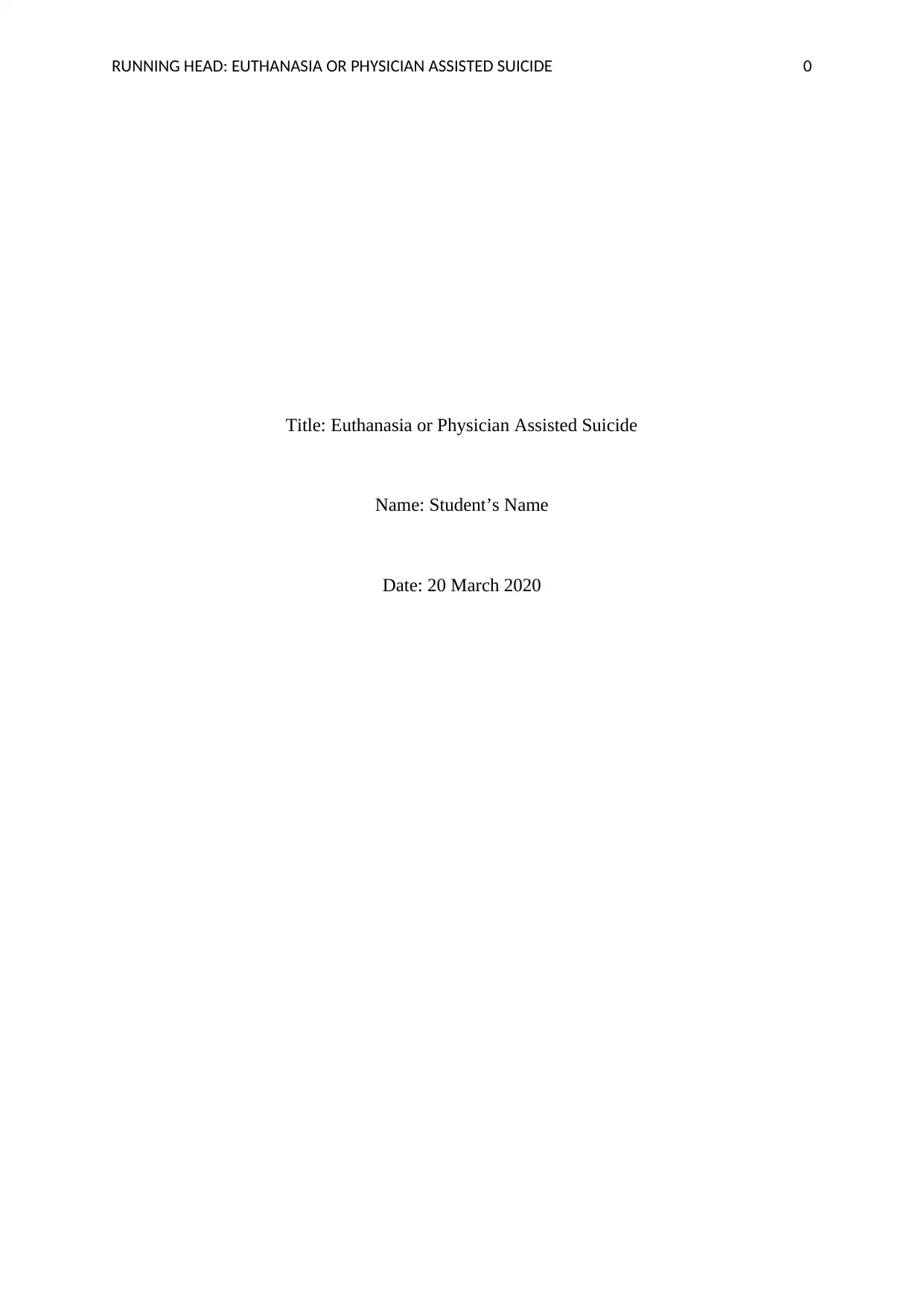
RUNNING HEAD: EUTHANASIA OR PHYSICIAN ASSISTED SUICIDE 0
Title: Euthanasia or Physician Assisted Suicide
Name: Student’s Name
Date: 20 March 2020
Title: Euthanasia or Physician Assisted Suicide
Name: Student’s Name
Date: 20 March 2020
Paraphrase This Document
Need a fresh take? Get an instant paraphrase of this document with our AI Paraphraser
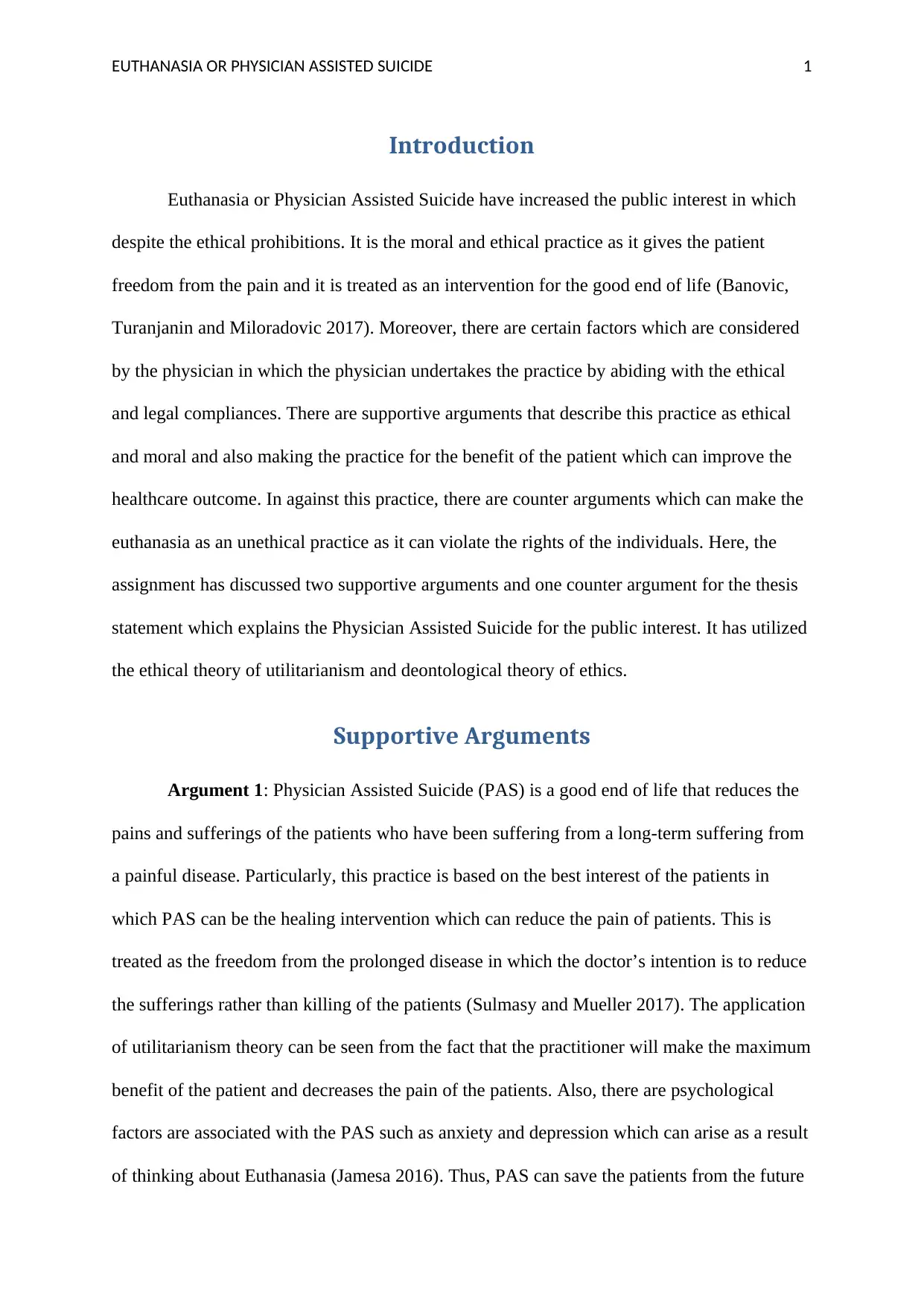
EUTHANASIA OR PHYSICIAN ASSISTED SUICIDE 1
Introduction
Euthanasia or Physician Assisted Suicide have increased the public interest in which
despite the ethical prohibitions. It is the moral and ethical practice as it gives the patient
freedom from the pain and it is treated as an intervention for the good end of life (Banovic,
Turanjanin and Miloradovic 2017). Moreover, there are certain factors which are considered
by the physician in which the physician undertakes the practice by abiding with the ethical
and legal compliances. There are supportive arguments that describe this practice as ethical
and moral and also making the practice for the benefit of the patient which can improve the
healthcare outcome. In against this practice, there are counter arguments which can make the
euthanasia as an unethical practice as it can violate the rights of the individuals. Here, the
assignment has discussed two supportive arguments and one counter argument for the thesis
statement which explains the Physician Assisted Suicide for the public interest. It has utilized
the ethical theory of utilitarianism and deontological theory of ethics.
Supportive Arguments
Argument 1: Physician Assisted Suicide (PAS) is a good end of life that reduces the
pains and sufferings of the patients who have been suffering from a long-term suffering from
a painful disease. Particularly, this practice is based on the best interest of the patients in
which PAS can be the healing intervention which can reduce the pain of patients. This is
treated as the freedom from the prolonged disease in which the doctor’s intention is to reduce
the sufferings rather than killing of the patients (Sulmasy and Mueller 2017). The application
of utilitarianism theory can be seen from the fact that the practitioner will make the maximum
benefit of the patient and decreases the pain of the patients. Also, there are psychological
factors are associated with the PAS such as anxiety and depression which can arise as a result
of thinking about Euthanasia (Jamesa 2016). Thus, PAS can save the patients from the future
Introduction
Euthanasia or Physician Assisted Suicide have increased the public interest in which
despite the ethical prohibitions. It is the moral and ethical practice as it gives the patient
freedom from the pain and it is treated as an intervention for the good end of life (Banovic,
Turanjanin and Miloradovic 2017). Moreover, there are certain factors which are considered
by the physician in which the physician undertakes the practice by abiding with the ethical
and legal compliances. There are supportive arguments that describe this practice as ethical
and moral and also making the practice for the benefit of the patient which can improve the
healthcare outcome. In against this practice, there are counter arguments which can make the
euthanasia as an unethical practice as it can violate the rights of the individuals. Here, the
assignment has discussed two supportive arguments and one counter argument for the thesis
statement which explains the Physician Assisted Suicide for the public interest. It has utilized
the ethical theory of utilitarianism and deontological theory of ethics.
Supportive Arguments
Argument 1: Physician Assisted Suicide (PAS) is a good end of life that reduces the
pains and sufferings of the patients who have been suffering from a long-term suffering from
a painful disease. Particularly, this practice is based on the best interest of the patients in
which PAS can be the healing intervention which can reduce the pain of patients. This is
treated as the freedom from the prolonged disease in which the doctor’s intention is to reduce
the sufferings rather than killing of the patients (Sulmasy and Mueller 2017). The application
of utilitarianism theory can be seen from the fact that the practitioner will make the maximum
benefit of the patient and decreases the pain of the patients. Also, there are psychological
factors are associated with the PAS such as anxiety and depression which can arise as a result
of thinking about Euthanasia (Jamesa 2016). Thus, PAS can save the patients from the future
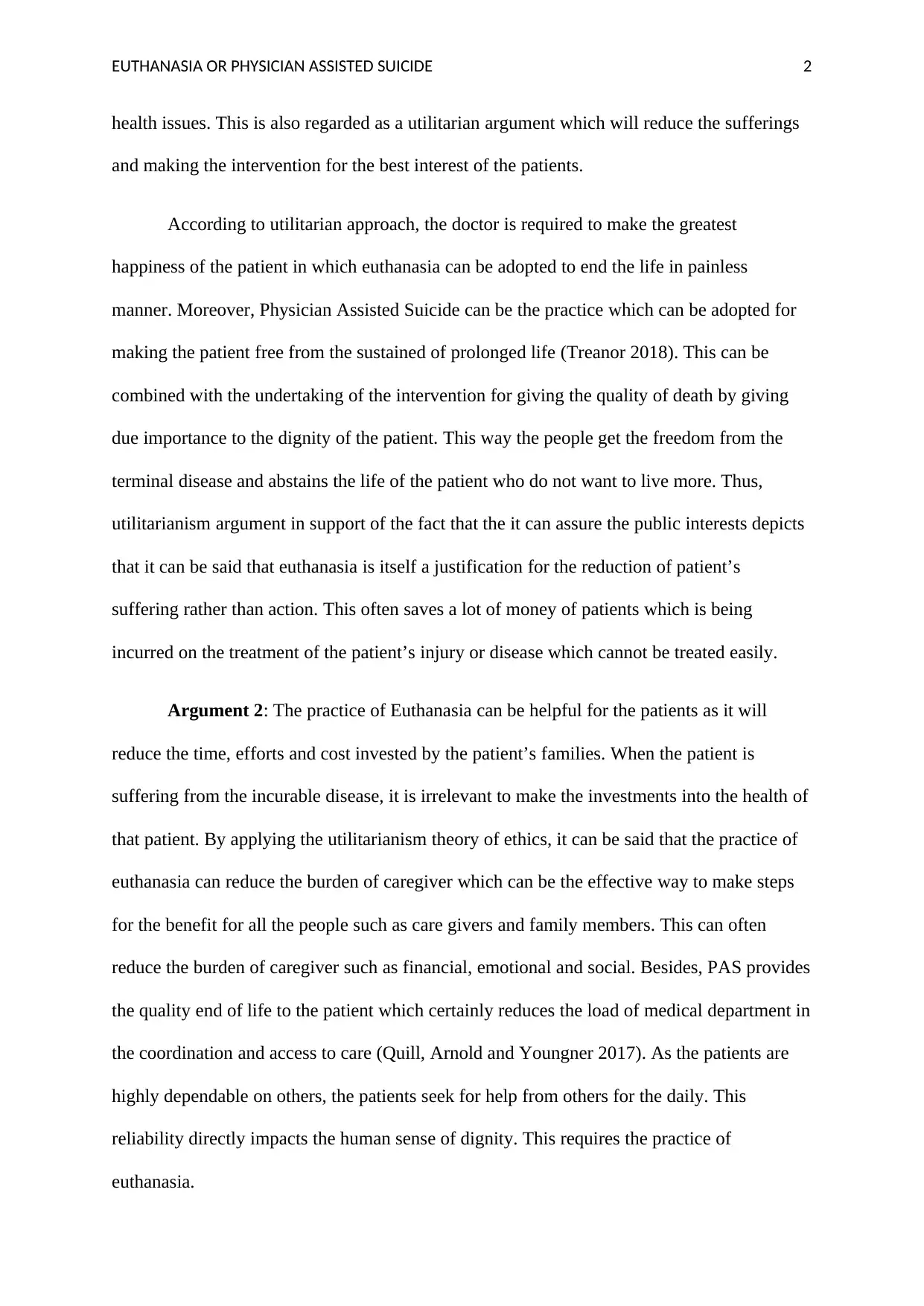
EUTHANASIA OR PHYSICIAN ASSISTED SUICIDE 2
health issues. This is also regarded as a utilitarian argument which will reduce the sufferings
and making the intervention for the best interest of the patients.
According to utilitarian approach, the doctor is required to make the greatest
happiness of the patient in which euthanasia can be adopted to end the life in painless
manner. Moreover, Physician Assisted Suicide can be the practice which can be adopted for
making the patient free from the sustained of prolonged life (Treanor 2018). This can be
combined with the undertaking of the intervention for giving the quality of death by giving
due importance to the dignity of the patient. This way the people get the freedom from the
terminal disease and abstains the life of the patient who do not want to live more. Thus,
utilitarianism argument in support of the fact that the it can assure the public interests depicts
that it can be said that euthanasia is itself a justification for the reduction of patient’s
suffering rather than action. This often saves a lot of money of patients which is being
incurred on the treatment of the patient’s injury or disease which cannot be treated easily.
Argument 2: The practice of Euthanasia can be helpful for the patients as it will
reduce the time, efforts and cost invested by the patient’s families. When the patient is
suffering from the incurable disease, it is irrelevant to make the investments into the health of
that patient. By applying the utilitarianism theory of ethics, it can be said that the practice of
euthanasia can reduce the burden of caregiver which can be the effective way to make steps
for the benefit for all the people such as care givers and family members. This can often
reduce the burden of caregiver such as financial, emotional and social. Besides, PAS provides
the quality end of life to the patient which certainly reduces the load of medical department in
the coordination and access to care (Quill, Arnold and Youngner 2017). As the patients are
highly dependable on others, the patients seek for help from others for the daily. This
reliability directly impacts the human sense of dignity. This requires the practice of
euthanasia.
health issues. This is also regarded as a utilitarian argument which will reduce the sufferings
and making the intervention for the best interest of the patients.
According to utilitarian approach, the doctor is required to make the greatest
happiness of the patient in which euthanasia can be adopted to end the life in painless
manner. Moreover, Physician Assisted Suicide can be the practice which can be adopted for
making the patient free from the sustained of prolonged life (Treanor 2018). This can be
combined with the undertaking of the intervention for giving the quality of death by giving
due importance to the dignity of the patient. This way the people get the freedom from the
terminal disease and abstains the life of the patient who do not want to live more. Thus,
utilitarianism argument in support of the fact that the it can assure the public interests depicts
that it can be said that euthanasia is itself a justification for the reduction of patient’s
suffering rather than action. This often saves a lot of money of patients which is being
incurred on the treatment of the patient’s injury or disease which cannot be treated easily.
Argument 2: The practice of Euthanasia can be helpful for the patients as it will
reduce the time, efforts and cost invested by the patient’s families. When the patient is
suffering from the incurable disease, it is irrelevant to make the investments into the health of
that patient. By applying the utilitarianism theory of ethics, it can be said that the practice of
euthanasia can reduce the burden of caregiver which can be the effective way to make steps
for the benefit for all the people such as care givers and family members. This can often
reduce the burden of caregiver such as financial, emotional and social. Besides, PAS provides
the quality end of life to the patient which certainly reduces the load of medical department in
the coordination and access to care (Quill, Arnold and Youngner 2017). As the patients are
highly dependable on others, the patients seek for help from others for the daily. This
reliability directly impacts the human sense of dignity. This requires the practice of
euthanasia.
⊘ This is a preview!⊘
Do you want full access?
Subscribe today to unlock all pages.

Trusted by 1+ million students worldwide
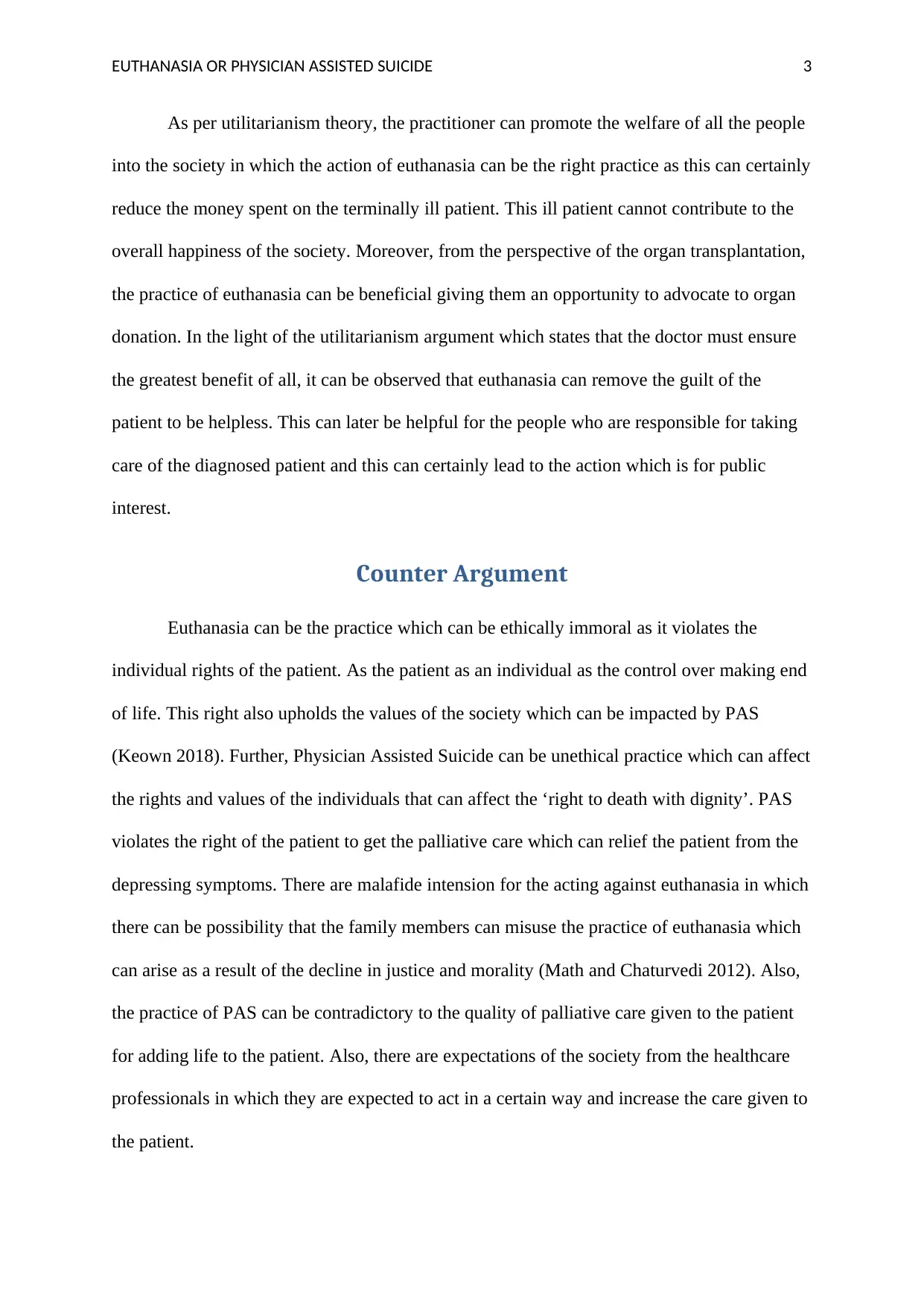
EUTHANASIA OR PHYSICIAN ASSISTED SUICIDE 3
As per utilitarianism theory, the practitioner can promote the welfare of all the people
into the society in which the action of euthanasia can be the right practice as this can certainly
reduce the money spent on the terminally ill patient. This ill patient cannot contribute to the
overall happiness of the society. Moreover, from the perspective of the organ transplantation,
the practice of euthanasia can be beneficial giving them an opportunity to advocate to organ
donation. In the light of the utilitarianism argument which states that the doctor must ensure
the greatest benefit of all, it can be observed that euthanasia can remove the guilt of the
patient to be helpless. This can later be helpful for the people who are responsible for taking
care of the diagnosed patient and this can certainly lead to the action which is for public
interest.
Counter Argument
Euthanasia can be the practice which can be ethically immoral as it violates the
individual rights of the patient. As the patient as an individual as the control over making end
of life. This right also upholds the values of the society which can be impacted by PAS
(Keown 2018). Further, Physician Assisted Suicide can be unethical practice which can affect
the rights and values of the individuals that can affect the ‘right to death with dignity’. PAS
violates the right of the patient to get the palliative care which can relief the patient from the
depressing symptoms. There are malafide intension for the acting against euthanasia in which
there can be possibility that the family members can misuse the practice of euthanasia which
can arise as a result of the decline in justice and morality (Math and Chaturvedi 2012). Also,
the practice of PAS can be contradictory to the quality of palliative care given to the patient
for adding life to the patient. Also, there are expectations of the society from the healthcare
professionals in which they are expected to act in a certain way and increase the care given to
the patient.
As per utilitarianism theory, the practitioner can promote the welfare of all the people
into the society in which the action of euthanasia can be the right practice as this can certainly
reduce the money spent on the terminally ill patient. This ill patient cannot contribute to the
overall happiness of the society. Moreover, from the perspective of the organ transplantation,
the practice of euthanasia can be beneficial giving them an opportunity to advocate to organ
donation. In the light of the utilitarianism argument which states that the doctor must ensure
the greatest benefit of all, it can be observed that euthanasia can remove the guilt of the
patient to be helpless. This can later be helpful for the people who are responsible for taking
care of the diagnosed patient and this can certainly lead to the action which is for public
interest.
Counter Argument
Euthanasia can be the practice which can be ethically immoral as it violates the
individual rights of the patient. As the patient as an individual as the control over making end
of life. This right also upholds the values of the society which can be impacted by PAS
(Keown 2018). Further, Physician Assisted Suicide can be unethical practice which can affect
the rights and values of the individuals that can affect the ‘right to death with dignity’. PAS
violates the right of the patient to get the palliative care which can relief the patient from the
depressing symptoms. There are malafide intension for the acting against euthanasia in which
there can be possibility that the family members can misuse the practice of euthanasia which
can arise as a result of the decline in justice and morality (Math and Chaturvedi 2012). Also,
the practice of PAS can be contradictory to the quality of palliative care given to the patient
for adding life to the patient. Also, there are expectations of the society from the healthcare
professionals in which they are expected to act in a certain way and increase the care given to
the patient.
Paraphrase This Document
Need a fresh take? Get an instant paraphrase of this document with our AI Paraphraser
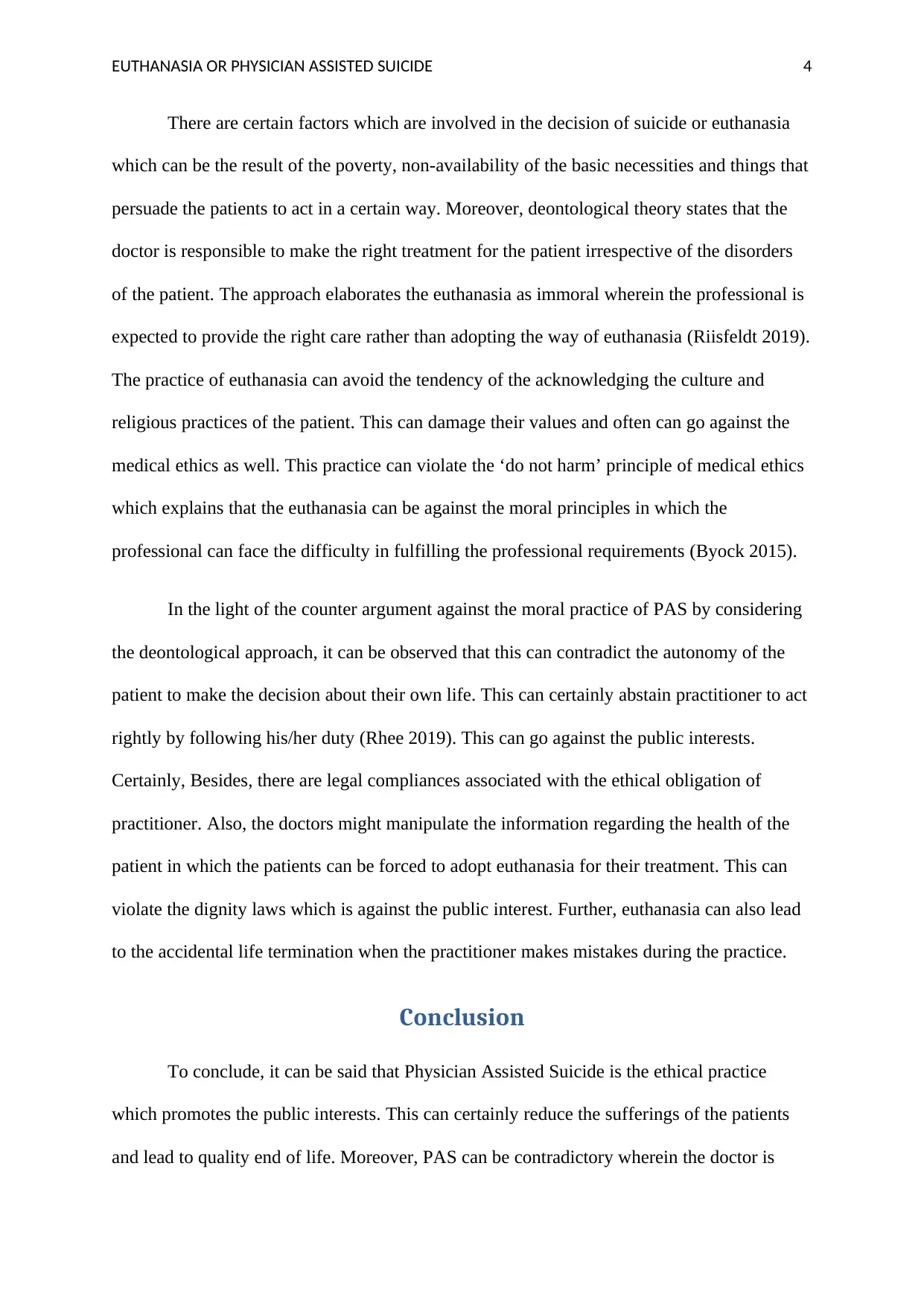
EUTHANASIA OR PHYSICIAN ASSISTED SUICIDE 4
There are certain factors which are involved in the decision of suicide or euthanasia
which can be the result of the poverty, non-availability of the basic necessities and things that
persuade the patients to act in a certain way. Moreover, deontological theory states that the
doctor is responsible to make the right treatment for the patient irrespective of the disorders
of the patient. The approach elaborates the euthanasia as immoral wherein the professional is
expected to provide the right care rather than adopting the way of euthanasia (Riisfeldt 2019).
The practice of euthanasia can avoid the tendency of the acknowledging the culture and
religious practices of the patient. This can damage their values and often can go against the
medical ethics as well. This practice can violate the ‘do not harm’ principle of medical ethics
which explains that the euthanasia can be against the moral principles in which the
professional can face the difficulty in fulfilling the professional requirements (Byock 2015).
In the light of the counter argument against the moral practice of PAS by considering
the deontological approach, it can be observed that this can contradict the autonomy of the
patient to make the decision about their own life. This can certainly abstain practitioner to act
rightly by following his/her duty (Rhee 2019). This can go against the public interests.
Certainly, Besides, there are legal compliances associated with the ethical obligation of
practitioner. Also, the doctors might manipulate the information regarding the health of the
patient in which the patients can be forced to adopt euthanasia for their treatment. This can
violate the dignity laws which is against the public interest. Further, euthanasia can also lead
to the accidental life termination when the practitioner makes mistakes during the practice.
Conclusion
To conclude, it can be said that Physician Assisted Suicide is the ethical practice
which promotes the public interests. This can certainly reduce the sufferings of the patients
and lead to quality end of life. Moreover, PAS can be contradictory wherein the doctor is
There are certain factors which are involved in the decision of suicide or euthanasia
which can be the result of the poverty, non-availability of the basic necessities and things that
persuade the patients to act in a certain way. Moreover, deontological theory states that the
doctor is responsible to make the right treatment for the patient irrespective of the disorders
of the patient. The approach elaborates the euthanasia as immoral wherein the professional is
expected to provide the right care rather than adopting the way of euthanasia (Riisfeldt 2019).
The practice of euthanasia can avoid the tendency of the acknowledging the culture and
religious practices of the patient. This can damage their values and often can go against the
medical ethics as well. This practice can violate the ‘do not harm’ principle of medical ethics
which explains that the euthanasia can be against the moral principles in which the
professional can face the difficulty in fulfilling the professional requirements (Byock 2015).
In the light of the counter argument against the moral practice of PAS by considering
the deontological approach, it can be observed that this can contradict the autonomy of the
patient to make the decision about their own life. This can certainly abstain practitioner to act
rightly by following his/her duty (Rhee 2019). This can go against the public interests.
Certainly, Besides, there are legal compliances associated with the ethical obligation of
practitioner. Also, the doctors might manipulate the information regarding the health of the
patient in which the patients can be forced to adopt euthanasia for their treatment. This can
violate the dignity laws which is against the public interest. Further, euthanasia can also lead
to the accidental life termination when the practitioner makes mistakes during the practice.
Conclusion
To conclude, it can be said that Physician Assisted Suicide is the ethical practice
which promotes the public interests. This can certainly reduce the sufferings of the patients
and lead to quality end of life. Moreover, PAS can be contradictory wherein the doctor is

EUTHANASIA OR PHYSICIAN ASSISTED SUICIDE 5
restrictive in the facilitation of right care. Here, the assignment has discussed the
utilitarianism and deontological approach of ethics for the explanation of the supportive and
counter arguments for the euthanasia as an ethical and moral practice. Moreover, euthanasia
is the practice that can make the higher welfare of the people through the intervention made
for the patients.
restrictive in the facilitation of right care. Here, the assignment has discussed the
utilitarianism and deontological approach of ethics for the explanation of the supportive and
counter arguments for the euthanasia as an ethical and moral practice. Moreover, euthanasia
is the practice that can make the higher welfare of the people through the intervention made
for the patients.
⊘ This is a preview!⊘
Do you want full access?
Subscribe today to unlock all pages.

Trusted by 1+ million students worldwide
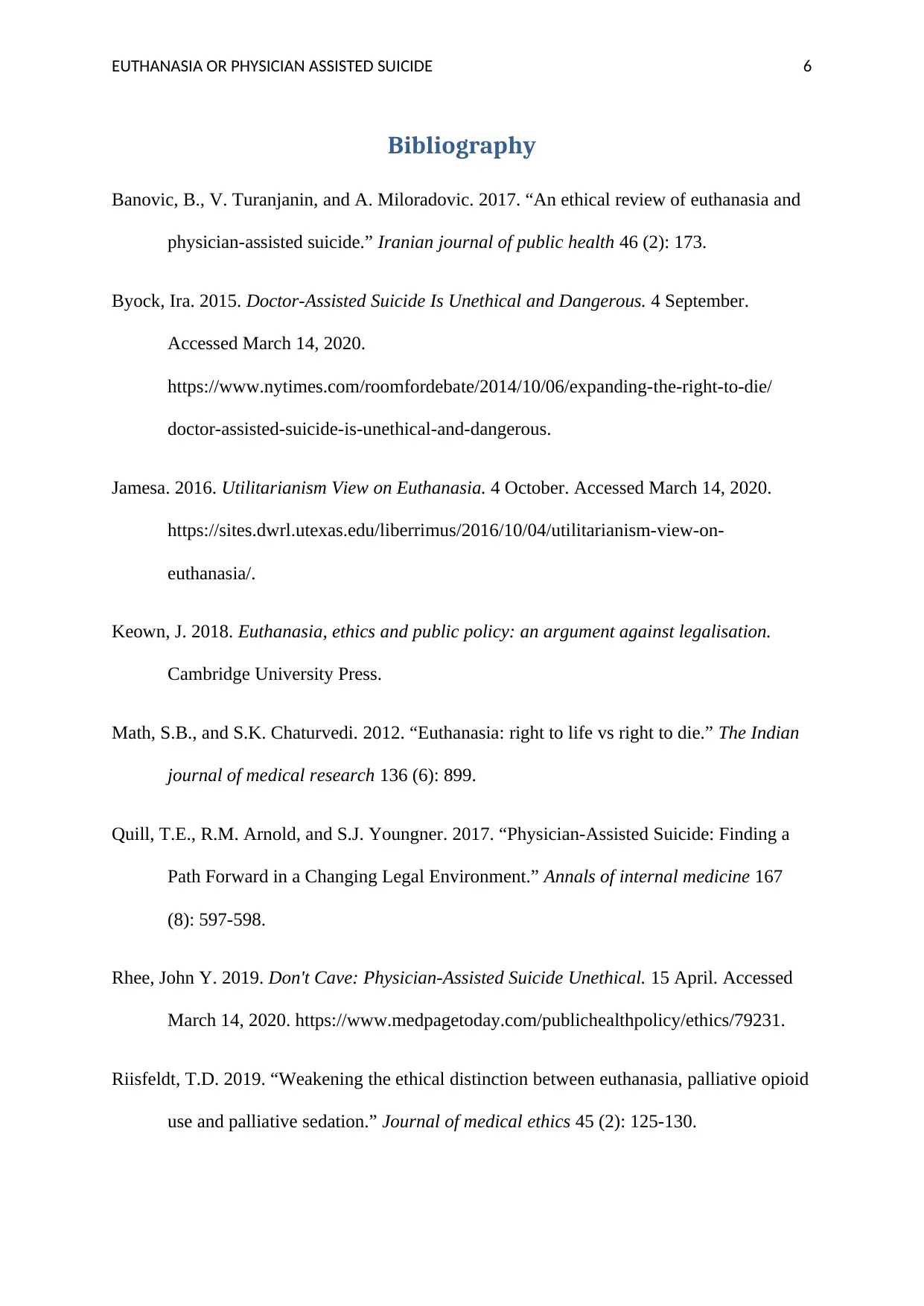
EUTHANASIA OR PHYSICIAN ASSISTED SUICIDE 6
Bibliography
Banovic, B., V. Turanjanin, and A. Miloradovic. 2017. “An ethical review of euthanasia and
physician-assisted suicide.” Iranian journal of public health 46 (2): 173.
Byock, Ira. 2015. Doctor-Assisted Suicide Is Unethical and Dangerous. 4 September.
Accessed March 14, 2020.
https://www.nytimes.com/roomfordebate/2014/10/06/expanding-the-right-to-die/
doctor-assisted-suicide-is-unethical-and-dangerous.
Jamesa. 2016. Utilitarianism View on Euthanasia. 4 October. Accessed March 14, 2020.
https://sites.dwrl.utexas.edu/liberrimus/2016/10/04/utilitarianism-view-on-
euthanasia/.
Keown, J. 2018. Euthanasia, ethics and public policy: an argument against legalisation.
Cambridge University Press.
Math, S.B., and S.K. Chaturvedi. 2012. “Euthanasia: right to life vs right to die.” The Indian
journal of medical research 136 (6): 899.
Quill, T.E., R.M. Arnold, and S.J. Youngner. 2017. “Physician-Assisted Suicide: Finding a
Path Forward in a Changing Legal Environment.” Annals of internal medicine 167
(8): 597-598.
Rhee, John Y. 2019. Don't Cave: Physician-Assisted Suicide Unethical. 15 April. Accessed
March 14, 2020. https://www.medpagetoday.com/publichealthpolicy/ethics/79231.
Riisfeldt, T.D. 2019. “Weakening the ethical distinction between euthanasia, palliative opioid
use and palliative sedation.” Journal of medical ethics 45 (2): 125-130.
Bibliography
Banovic, B., V. Turanjanin, and A. Miloradovic. 2017. “An ethical review of euthanasia and
physician-assisted suicide.” Iranian journal of public health 46 (2): 173.
Byock, Ira. 2015. Doctor-Assisted Suicide Is Unethical and Dangerous. 4 September.
Accessed March 14, 2020.
https://www.nytimes.com/roomfordebate/2014/10/06/expanding-the-right-to-die/
doctor-assisted-suicide-is-unethical-and-dangerous.
Jamesa. 2016. Utilitarianism View on Euthanasia. 4 October. Accessed March 14, 2020.
https://sites.dwrl.utexas.edu/liberrimus/2016/10/04/utilitarianism-view-on-
euthanasia/.
Keown, J. 2018. Euthanasia, ethics and public policy: an argument against legalisation.
Cambridge University Press.
Math, S.B., and S.K. Chaturvedi. 2012. “Euthanasia: right to life vs right to die.” The Indian
journal of medical research 136 (6): 899.
Quill, T.E., R.M. Arnold, and S.J. Youngner. 2017. “Physician-Assisted Suicide: Finding a
Path Forward in a Changing Legal Environment.” Annals of internal medicine 167
(8): 597-598.
Rhee, John Y. 2019. Don't Cave: Physician-Assisted Suicide Unethical. 15 April. Accessed
March 14, 2020. https://www.medpagetoday.com/publichealthpolicy/ethics/79231.
Riisfeldt, T.D. 2019. “Weakening the ethical distinction between euthanasia, palliative opioid
use and palliative sedation.” Journal of medical ethics 45 (2): 125-130.
Paraphrase This Document
Need a fresh take? Get an instant paraphrase of this document with our AI Paraphraser
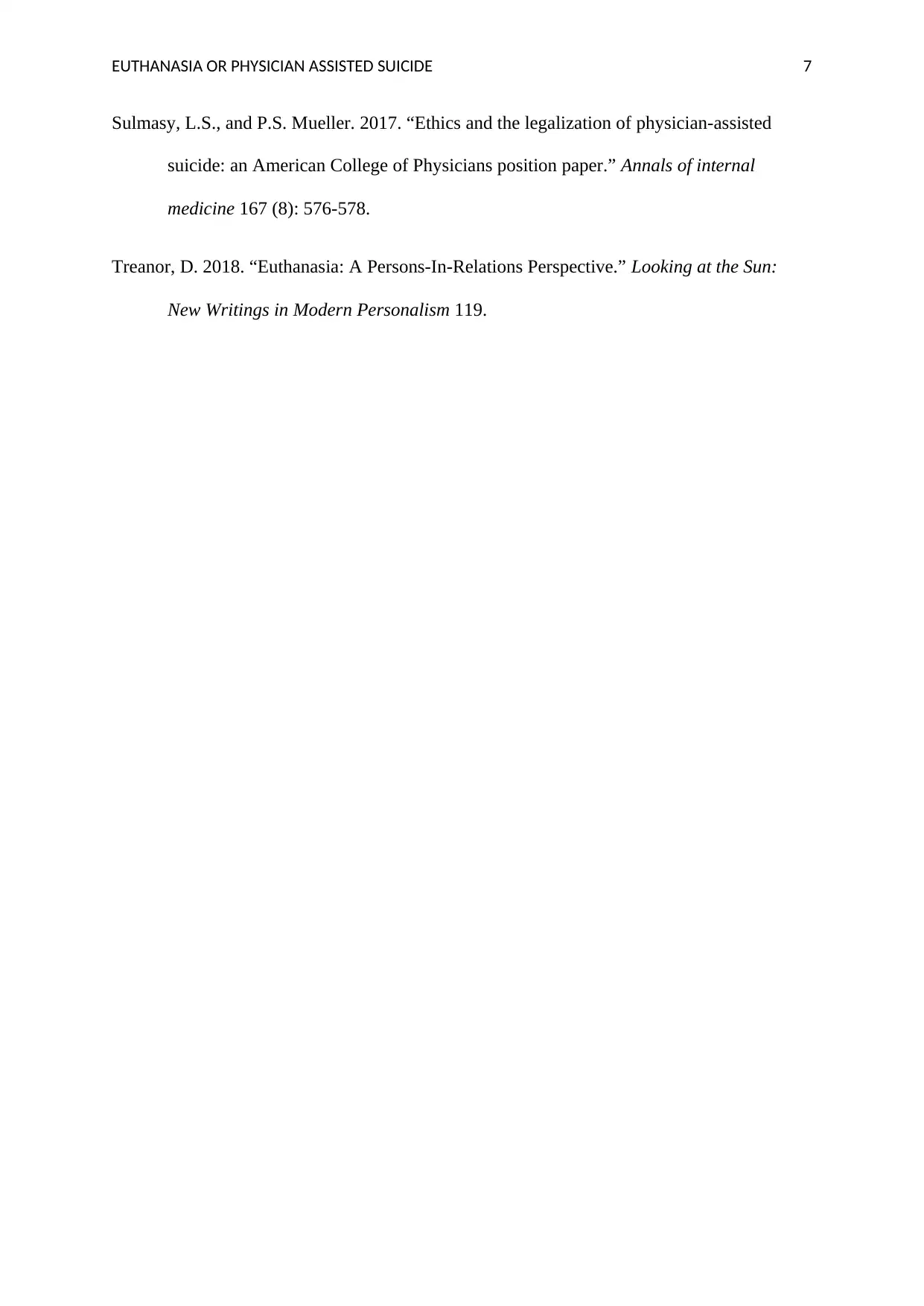
EUTHANASIA OR PHYSICIAN ASSISTED SUICIDE 7
Sulmasy, L.S., and P.S. Mueller. 2017. “Ethics and the legalization of physician-assisted
suicide: an American College of Physicians position paper.” Annals of internal
medicine 167 (8): 576-578.
Treanor, D. 2018. “Euthanasia: A Persons-In-Relations Perspective.” Looking at the Sun:
New Writings in Modern Personalism 119.
Sulmasy, L.S., and P.S. Mueller. 2017. “Ethics and the legalization of physician-assisted
suicide: an American College of Physicians position paper.” Annals of internal
medicine 167 (8): 576-578.
Treanor, D. 2018. “Euthanasia: A Persons-In-Relations Perspective.” Looking at the Sun:
New Writings in Modern Personalism 119.

EUTHANASIA OR PHYSICIAN ASSISTED SUICIDE 8
⊘ This is a preview!⊘
Do you want full access?
Subscribe today to unlock all pages.

Trusted by 1+ million students worldwide

EUTHANASIA OR PHYSICIAN ASSISTED SUICIDE 9
1 out of 10
Related Documents
Your All-in-One AI-Powered Toolkit for Academic Success.
+13062052269
info@desklib.com
Available 24*7 on WhatsApp / Email
![[object Object]](/_next/static/media/star-bottom.7253800d.svg)
Unlock your academic potential
Copyright © 2020–2026 A2Z Services. All Rights Reserved. Developed and managed by ZUCOL.



